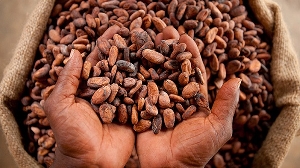Ghana recorded a historic production of 1,045,000 tonnes of cocoa in the 2021/2022 crop season, Mr Joseph Boahin Aidoo, the Chief Executive Officer of the Ghana Cocoa Board (COCOBOD) has said.
He said the nation’s average cocoa production had now increased from 450 kilogram per hectare (kg/ha) from 2017 to an impressive 800 kg/ha now.
Describing it as unprecedented, Mr Aidoo said the achievements were because of the implementation of various laudable interventions and initiatives by the government.
Some of the initiatives included the Cocoa Rehabilitation Programme which stood out as a crucial response to the devastating impact of the cocoa swollen shoot virus disease (CSSVD) that had plagued the industry.
Mr Aidoo made this known at the celebration of the 2024 annual festival of the ‘Brong-Ahafo’ Women Co-operative Farmers and Marketing Central Union (BAWCOF) festival 2024, held at Goaso, in the Ahafo Region.
It was on the theme “Growing a gender-equal future: Empowering women and youth in agriculture,” and brought together about 7,000 of the Union drawn from 96 societies in nine cocoa districts in the Bono and Ahafo Regions.
On the rehabilitation programme, Mr Aidoo said 74,813 farms covering 67,385.43 hectares and owned by 56,105 farmers had been rehabilitated and were doing well.
He said out of the figure 44,480 farms, which covered 40,150.40 hectares belonging to 28,510 farmers, were matured as of August 2024 and would be handed over to the farmers.
He said other interventions including pruning and hand pollination remained a game-changer in improving quality beans.
Mr Aidoo said he was highly impressed about an achievement of a female cocoa farmer who recorded productivity of 6.7 tonnes per hectare or 41 bags per acre, surpassing her male counterpart who produced 4.1 tonnes per hectare in the season.
“This clearly demonstrates the capabilities of women cocoa farmers in the country,” he stated, adding that for the first time in 32 years, COCOBOD did not resort to offshore borrowing or annual syndication.
Mr Aidoo indicated that “while successive National Democratic Congress (NDC) governments sought overseas loans for cocoa financing, successive New Patriotic Party (NPP) administrations successfully transitioned the country from over-reliance on foreign loans”.
He said COCOBOD had adopted ‘zero-borrowing model’ to finance the 204/2025 crop season under the President Nana Addo Dankwa Akufo-Addo’s government, saying since the season began in mid-September, farmers had been receiving prompt payments compared to the previous years.
Additionally, the Licensed Buying Companies (LBCs) were now demonstrating a faster turnaround in their purchases and deliveries, he said.
Mr Michael P. K Asumanu, the Bono, Bono East and Ahafo Regional Administrator of the COCOBOD said women played a crucial role in the cocoa value chain, saying women were actively involved in preparing seedlings, harvesting, drying, and sale of cocoa beans.
However, he expressed concern about certain barriers that hindered women’s equality in cocoa farming, mentioning limited access to resources including land for farming and time constraints due to household responsibilities as some of the barriers.
Mr Asumanu said discriminatory social norms, perceptions, and cultural practices also had a significant impact on women’s participation in productive activities in the cocoa value chain.
Ms Martha Addai, the President of BAWCOF, urged stakeholders to help fight illegal mining, saying illegal mining activities “galamsey” continued to threaten the cocoa industry.
She also cautioned cocoa farmers against smuggling of the beans to neighbouring countries, highlighting the importance of selling the produce locally to bolster the economy, thereby enhancing the socio-economic livelihoods of the people.
Ms Addai said the union was collaborating with Non-Governmental Organisations which were providing valuable training and support not only to improve cocoa production but also empowering farmers to be economically sustained in the off seasons.
She said BAWCOF collectively managed 6,857.82 hectares of cocoa farms that yielded 82,923 bags of cocoa in each farming season.
The celebration also offered an opportunity for the union members to undergo free breast cancer screening organised by the personnel of the Cocoa Clinic.
Business News of Sunday, 3 November 2024
Source: GNA

















